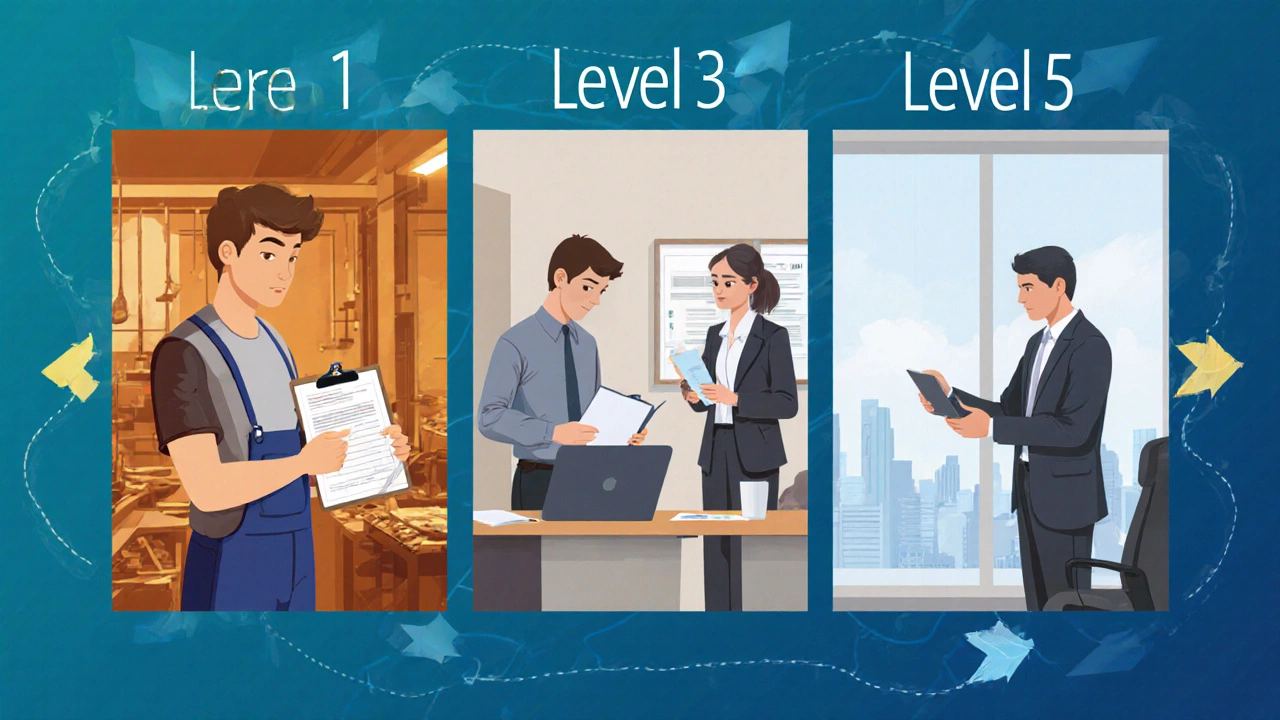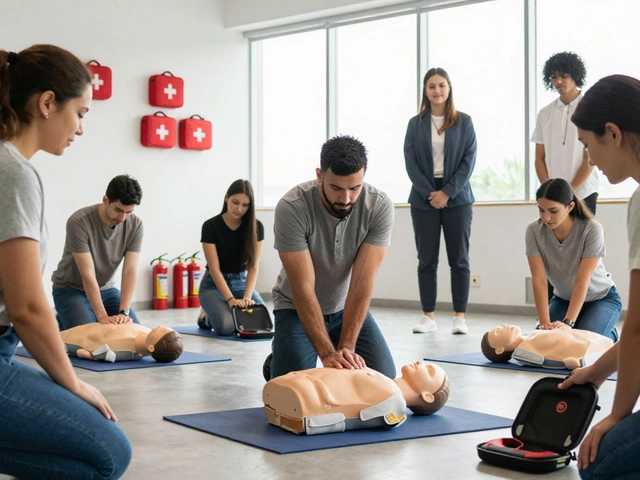NVQ Level Selector
Find Your Ideal NVQ Level
Answer a few questions to discover which NVQ level aligns with your current role and career aspirations.
When you hear the term NVQ courses, you might wonder whether they’re a fancy diploma, an apprenticeship shortcut, or something only for specific trades. In plain English, they’re work‑based qualifications that prove you can do a job to the standards required by employers and the government. Whether you’re eyeing a career in construction, health‑care, or retail, NVQs give you a clear path to prove your skills without spending years in a classroom.
Key Takeaways
- NVQ stands for National Vocational Qualification, a work‑based credential recognized across the UK.
- There are five levels, from basic tasks (Level1) to advanced professional expertise (Level5).
- Courses are delivered by colleges, private training providers, and some employers.
- Completion leads to higher employability, potential salary boosts, and further study options.
- NVQs are regulated by Ofqual and can be compared with BTECs, GCSEs, and apprenticeships.
NVQ courses are a type of vocational qualification that assess practical competence in a real‑world work setting. Unlike purely academic qualifications, the assessment is based on evidence you collect while performing your job, such as logs, supervisor reports, and direct observation. The governing body Ofqual ensures the standards remain consistent across England, Wales, and Northern Ireland.
How NVQ Levels Work
The NVQ framework is divided into five progressive levels:
- Level1 - Basic tasks and simple responsibilities. Ideal for entry‑level roles.
- Level2 - Routine work that requires some autonomy. Equivalent to a GCSE grade.
- Level3 - Supervisory responsibilities and complex tasks. Often matched with A‑level or BTEC Level3.
- Level4 - Management and specialist expertise. Comparable to a foundation degree.
- Level5 - Senior management or highly technical roles. Aligns with an honours degree.
Each level builds on the previous one, so you can start at Level1 and work your way up as you gain experience. The assessment for each level involves a portfolio of evidence, a workplace observation by an approved assessor, and sometimes a final interview.
Who Offers NVQ Courses?
NVQ training isn’t confined to a single type of provider. The main delivery routes are:
- Further education colleges - Most colleges have dedicated vocational departments offering a wide range of NVQs.
- Private training providers - Companies that specialize in industry‑specific training, such as construction or health‑care.
- Employers - Many large employers run in‑house NVQ programmes as part of their apprenticeship schemes.
- Sector Skills Councils (SSCs) - These bodies work with industry to develop the standards and sometimes deliver courses directly.
When choosing a provider, look for Ofqual registration, a track record of successful candidates, and clear support for evidence gathering.

How to Enroll and What to Expect
Signing up for an NVQ is straightforward, but you’ll need to prepare a few things:
- Identify the level that matches your current role or career goal.
- Contact a local college or training provider and request the NVQ prospectus.
- Complete a short enrolment form; many providers offer free or subsidised places for unemployed learners.
- Work with your employer to set up a training plan and allocate time for evidence collection.
- Attend any required introductory sessions, usually a half‑day workshop covering assessment criteria.
From there, you’ll spend several weeks to months building a portfolio. Typical evidence includes:
- Work logs documenting daily tasks.
- Supervisor sign‑offs confirming competence.
- Photos or videos of you performing the skill.
- Written reflections on what you learned.
Once your portfolio is ready, an external assessor from an assessment centre will visit your workplace, observe you in action, and interview you about the evidence. If they’re satisfied, you’ll receive the NVQ certificate for that level.
Benefits of Getting an NVQ
Why invest time in an NVQ? Here are the top advantages candidates report:
- Career progression - Employers recognise NVQs as proof of competence, often leading to promotions.
- Higher earnings - The UK Office for National Statistics shows an average salary increase of 7% for workers who hold a Level3 NVQ or higher.
- Portability - NVQs are nationally recognised, so you can move between regions or sectors without starting from scratch.
- Further study pathways - Many universities accept NVQs for entry into higher‑education programmes, especially at Levels4 and5.
- Employer support - Many companies will fund the cost of the course as part of their skills development budget.
NVQ vs. Other UK Qualifications
Choosing the right qualification often means comparing NVQs with other routes. The table below highlights the key differences.
| Qualification | Typical Level | Learning Style | Assessment Method | Recognition |
|---|---|---|---|---|
| NVQ | 1‑5 (work‑based) | On‑the‑job | Portfolio + workplace observation | National, industry‑specific |
| BTEC | 1‑7 (academic & vocational) | College classroom + projects | Coursework & exams | Widely accepted for university entry |
| GCSE | 2 (school‑based) | Classroom theory | Written exams | Baseline for further study |
| Apprenticeship | 2‑6 (combines work & study) | Hybrid (on‑the‑job + classroom) | Portfolio, end‑point assessment | Employer‑driven, leads to NVQ at Level3+ |
In short, NVQs focus purely on workplace competence, while BTECs and GCSEs blend theory with practical work. Apprenticeships often culminate in an NVQ, making them a natural stepping‑stone for many learners.
Common Pitfalls and Pro Tips
Even though NVQs are flexible, candidates often stumble on a few avoidable issues:
- Insufficient evidence: Gather documentation continuously; waiting until the last minute leads to gaps.
- Unclear expectations: Sit down with your assessor early to confirm what constitutes ‘competent performance.’
- Employer disengagement: Secure a mentor or line manager who will actively sign off your work.
- Choosing the wrong level: If you’re unsure, start at Level2 and progress; you can always move up later.
Pro tip: Use a simple spreadsheet to track each competency, the evidence you’ve collected, and the date it was approved. This visual checklist keeps the process transparent for both you and the assessor.
Next Steps: Picking the Right NVQ for You
Ready to take action? Follow this quick decision tree:
- Determine your current role and career ambition.
- If you need a baseline credential for entry‑level jobs, aim for Level1 or2.
- If you already supervise a small team, Level3 is a solid fit.
- For managers or specialist technicians, target Level4 or5.
- Check with your employer whether they fund the chosen level.
- Contact a nearby college (e.g., Bristol College of Technology) and ask for a course brochure.
Remember, the NVQ journey is about proving what you already do at work, not learning a completely new skill set. The more you can tie your daily tasks to the qualification standards, the smoother the assessment will be.
Frequently Asked Questions
What does NVQ stand for?
NVQ stands for National Vocational Qualification, a work‑based credential that measures competence in a specific job role.
How long does it take to complete an NVQ?
The timeline varies by level and industry, but most learners finish Level2 or3 within 3‑6 months of part‑time study, while Level4‑5 can take 12‑18 months.
Are NVQs recognised across the UK?
Yes. NVQs are regulated by Ofqual and are accepted by employers, colleges, and many universities throughout England, Wales, and Northern Ireland.
Can I get an NVQ while working full‑time?
Absolutely. Since the assessment is based on evidence you collect at work, most candidates study part‑time and fit the portfolio tasks around their regular shifts.
What’s the cost of an NVQ?
Fees differ by provider and level; a Level2 NVQ might cost £300‑£600, while Level4 can be £1,200‑£2,000. Many employers cover the expense, and government funding may be available for unemployed learners.





Write a comment